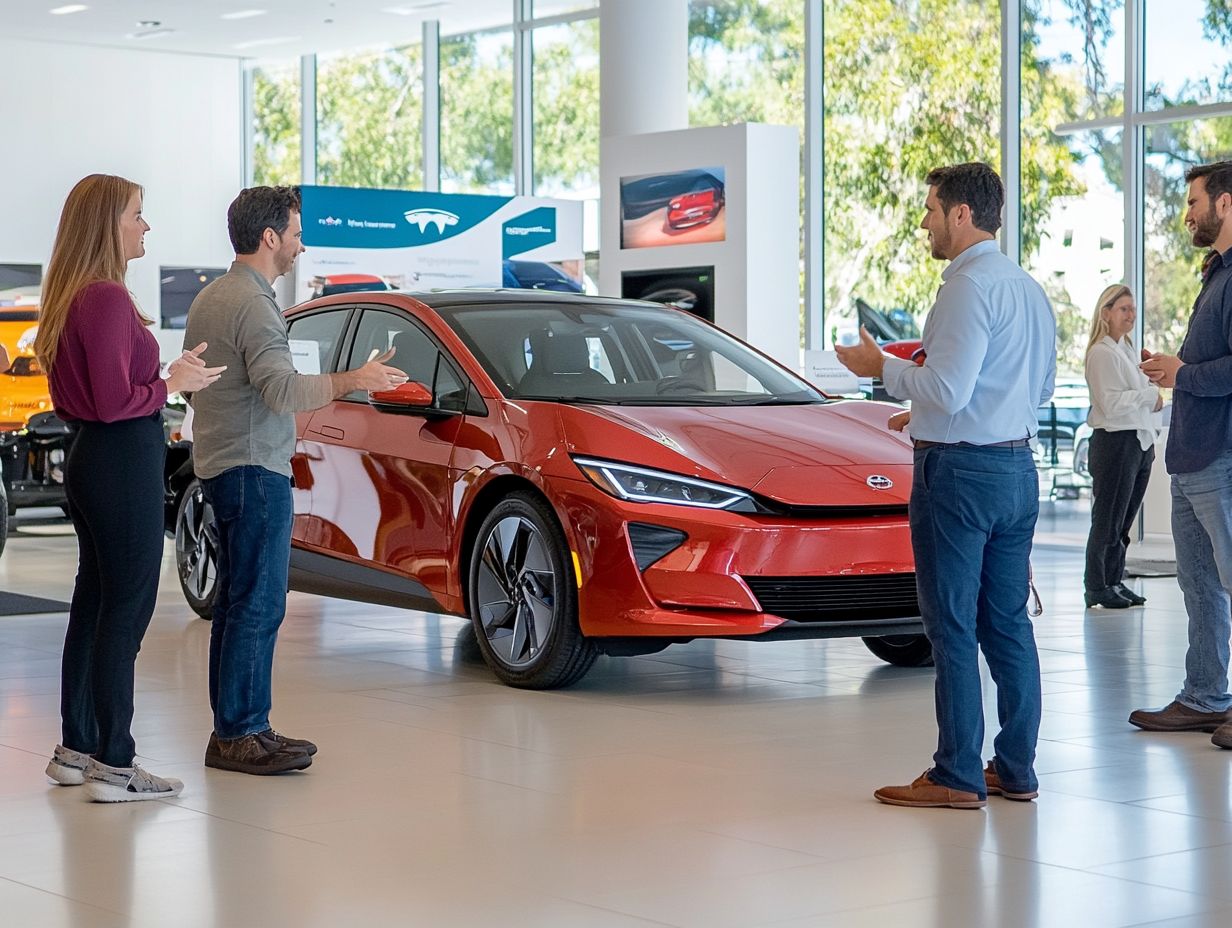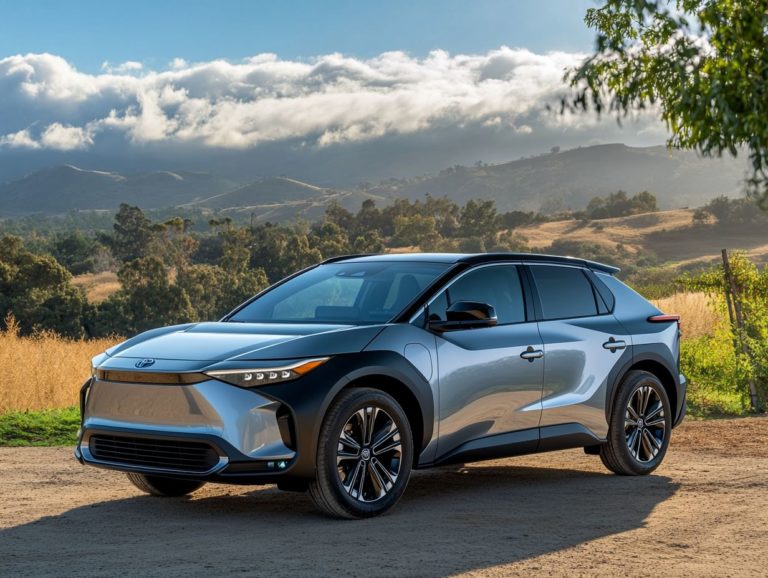5 Essential Tips for First-Time EV Buyers
Are you considering the switch to an electric vehicle (EV)? With the rise of EVs, it’s vital to understand your needs and options before making a purchase.
This guide offers five essential tips for first-time buyers like you. It will help you evaluate your driving habits, explore different types of EVs, and navigate the financial landscape.
We will highlight the advantages of owning an EV and address common concerns you may have. Get ready to make a well-informed decision!
Contents
- Key Takeaways:
- 1. Understand Your Driving Habits and Needs
- 2. Research Different Types of EVs
- 3. Consider Your Budget and Available Incentives
- 4. Plan for Charging and Maintenance Costs
- 5. Test Drive Before Making a Decision
- What Are the Benefits of Owning an EV?
- What Are the Top EV Models on the Market?
- What Are the Common Concerns About Owning an EV?
- Frequently Asked Questions
- What are the 5 essential tips that first-time EV buyers should know?
- Why is researching and understanding EV technology important?
- How can I determine my driving needs when considering an EV?
- Are there any financial benefits for first-time EV buyers?
- Do I need to choose a specific EV dealer when purchasing my first EV?
- Is it important to test drive multiple EV models before making a decision?
Key Takeaways:

- Understand your driving habits to find the most suitable EV.
- Research different types of EVs to fit your lifestyle and budget.
- Consider your budget and available incentives for a cost-effective decision.
1. Understand Your Driving Habits and Needs
Knowing your driving habits is key to choosing the right electric vehicle (EV). Assess daily commutes, long trips, and your charging preferences.
This evaluation will help you identify any worries about running out of charge while driving. For instance, the Tesla Model S is great for long journeys, while the Hyundai KONA suits urban drivers with shorter trips.
If you’re looking for a budget-friendly option, consider the Nissan LEAF. Also, be mindful of etiquette at public charging stations for a smooth experience.
2. Research Different Types of EVs
Explore the various types of electric vehicles (EVs) to find your best match. The market features models like the Tesla Model S, Hyundai KONA, and Nissan LEAF, each with unique qualities.
Battery electric vehicles (BEVs) run solely on electricity and can offer ranges over 300 miles per charge perfect for long commutes. On the other hand, plug-in hybrid electric vehicles (PHEVs) use both electricity and gasoline, ideal for those without easy access to charging stations.
Features like regenerative braking, which recharges the battery while driving, enhance efficiency. This appeals to environmentally conscious consumers who value performance and sustainability.
3. Consider Your Budget and Available Incentives
Aligning your budget with available incentives is crucial when considering an EV. These incentives can significantly reduce your overall cost of ownership.
Depending on your location, you might find rebates, reduced registration fees, and grants for home charging setups. Taking full advantage of these programs makes EVs more accessible compared to traditional gasoline vehicles.
Many EVs come with lower maintenance costs due to fewer moving parts. Over time, savings on fuel and maintenance can enhance the financial viability of your choice.
4. Plan for Charging and Maintenance Costs

Planning for charging and maintenance costs is crucial when you own an electric vehicle (EV). Understanding the various places to charge whether through a Level 1, Level 2, or Level 3 charger can significantly enhance your ownership experience and save you money.
Level 1 chargers plug into a standard household outlet and are the most budget-friendly option. However, be prepared for a slower charging rate, which might require several hours to reach a full charge.
Level 2 chargers, available for home installation or at public charging stations, charge much faster. These typically cost between $200 to $600 for the unit alone, with installation possibly adding another $1,000 or more, depending on your electrical setup.
Level 3 chargers, found at fast-charging stations, come with a higher price tag but deliver an incredibly rapid charge. They are perfect for those long road trips. Many EV owners find that having the convenience of home charging reduces costs and minimizes downtime.
The maintenance advantages of EVs can lead to substantial savings over the vehicle’s lifespan, enhancing the overall cost-effectiveness of your electric vehicle journey.
5. Test Drive Before Making a Decision
Don’t skip the test drive! It’s your chance to find the perfect electric vehicle (EV). This opportunity allows you to evaluate the driving experience, comfort, and handling of various models, including standout choices like the Tesla Model S.
Experiencing different models firsthand helps you appreciate the subtle differences in driving dynamics, acceleration, and the impressive array of technology features each vehicle offers. This hands-on exploration is crucial for ensuring that your chosen EV aligns with your unique driving habits and preferences.
Consider factors such as whether you’re primarily navigating city streets or cruising on the highway, the importance of trunk space, and even the need for advanced safety features. All these should guide your decision-making process. Ultimately, testing these vehicles in real-world conditions will give you invaluable insights into which electric car best suits your lifestyle needs.
What Are the Benefits of Owning an EV?
Owning an electric vehicle (EV) offers a wealth of benefits, from significant maintenance savings to a comprehensive EV warranty, all while reducing your environmental impact. Driving an EV helps create a cleaner planet, perfectly aligned with society’s shift toward greener solutions.
As you navigate the roads, you’ll find that lower operational costs lead to substantial savings over time. After all, electricity is generally cheaper than gasoline, and EVs require less frequent servicing, making them a smart choice for your wallet.
You might also find discounts or incentives from local governments, which can enhance the value proposition and help offset your initial purchase price. With advances in technology, range anxiety has become a thing of the past. An expanding network of charging stations and longer battery lives in newer models make electric driving more accessible. This not only respects the environment but also encourages financial prudence as you drive into the future.
What Are the Different Types of EVs Available?
The electric vehicle market presents a wealth of options tailored to your needs. From fully electric models like the Tesla Model S, Hyundai KONA, and Nissan LEAF to versatile plug-in hybrids, each option is designed with distinct preferences in mind.
Understanding these classifications enables you to make informed decisions that align with your lifestyle. Battery Electric Vehicles (BEVs), which run exclusively on electricity, offer zero emissions and impressive ranges that can exceed 300 miles on a single charge. They are a fantastic choice for eco-conscious drivers!
Conversely, Plug-in Hybrid Electric Vehicles (PHEVs) are equipped with both an electric motor and a gasoline engine, providing the flexibility to switch between power sources. This versatility can be especially beneficial for longer journeys.
By evaluating factors such as range, charging options, and performance features, you can confidently navigate the electric vehicle landscape and learn how to choose the right electric vehicle for you, ensuring the perfect fit for your driving needs.
What Are the Government Incentives for EV Buyers?

Government incentives for electric vehicle (EV) buyers, such as tax credits introduced by the Inflation Reduction Act, can significantly lower the overall cost of purchasing an EV. This makes buying an EV more attractive as you look for eco-friendly travel options.
Incentives can vary widely based on the specific model you re considering and the region where you make the purchase. Some states might offer additional rebates or grants on top of federal credits, while others implement unique programs to encourage the adoption of electric vehicles within their communities.
You can maximize your savings by doing your homework on these various offers, especially if you focus on vehicles that qualify for the highest incentives. Plus, by utilizing energy-efficient home charging solutions, you might unlock even more rebates, underscoring the importance of being well-informed about the many layers of incentives available.
How Can You Calculate the Total Cost of Owning an EV?
Calculating the total cost of owning an electric vehicle (EV) requires you to consider a variety of factors. Key considerations include the purchase price, ongoing maintenance savings, insurance, and the potential longevity provided by an EV warranty.
To gain a clearer understanding of what it truly means to own an EV, it’s essential to evaluate the initial expenses from the get-go. This includes exploring state rebates and financing options, which can significantly impact your upfront costs, as outlined in 5 tips for a smooth new car purchase experience.
Running costs play a critical role as well, encompassing electricity bills, charging infrastructure, and the frequency with which you need to charge the vehicle all of which directly influence your overall savings. With lower maintenance costs compared to traditional vehicles, you might find yourself reaping substantial savings over time.
Therefore, it s wise to carefully draft a comprehensive budget that accounts for all these components. This ensures you conduct a thorough assessment of affordability and long-term financial commitment.
What Are the Top EV Models on the Market?
The electric vehicle market is thriving, with exciting models like the Tesla Model S, Hyundai KONA, and Nissan LEAF making waves. These vehicles feature the latest technology and impressive driving performance.
For instance, the Tesla Model S boasts a remarkable range of over 370 miles on a single charge. It also offers exhilarating acceleration, transforming your daily commute into something closer to an adventure.
Next up is the Hyundai KONA, which shines with its user-friendly infotainment system and surprisingly spacious interior. It s an excellent choice for families and city dwellers alike.
On the other hand, the Nissan LEAF appeals to budget-conscious drivers. It offers a reliable range of about 150 miles while remaining competitively priced perfect for those just dipping their toes into electric driving.
User feedback consistently highlights the practicality and ease of use of these models. This information can greatly assist you in making an informed decision as a potential buyer.
What Are the Common Concerns About Owning an EV?
Common concerns about owning an electric vehicle (EV) often include range anxiety, the sufficiency of the charging network, and the availability of public charging stations. These factors can influence your decision to buy.
As a first-time EV owner, you may not yet realize the impressive progress being made in charging technology and infrastructure. Innovations like fast-charging stations and home charging solutions have dramatically improved the convenience and accessibility of charging options.
Many urban areas are actively expanding their networks to support the rising number of electric vehicles. This ensures ample access to charging points, easing worries about long trips and enhancing your overall EV ownership experience.
Frequently Asked Questions

What are the 5 essential tips that first-time EV buyers should know?
The 5 essential tips for first-time EV buyers are:
- Researching and understanding EV technology
- Determining your driving needs
- Considering your budget and available tax incentives
- Choosing a reputable EV dealer
- Test driving multiple EV models
Why is researching and understanding EV technology important?
Understanding EV technology helps you make an informed decision and choose the right model that meets your needs, including knowing how to finance your first electric vehicle.
How can I determine my driving needs when considering an EV?
Determine your driving needs by considering your daily commute, frequency of long trips, and access to charging stations. This will help you choose an EV with the appropriate range and charging capabilities.
Are there any financial benefits for first-time EV buyers?
Yes, first-time EV buyers can benefit from federal and state tax incentives, lower maintenance costs, and potential savings on fuel costs. Additionally, essential tips for first-time car leasees can help them navigate the leasing process effectively.
Do I need to choose a specific EV dealer when purchasing my first EV?
It is recommended to choose a reputable EV dealer with experience and knowledge in the electric vehicle market. For new car buyers, following 5 must-read tips ensures a smooth and trustworthy buying experience.
Is it important to test drive multiple EV models before making a decision?
Yes, test driving multiple EV models is important to get a feel for the driving experience and to compare different features and capabilities. This will help you choose the right EV for your needs and preferences.
Ready to make the switch to electric? Discover your perfect EV today!





